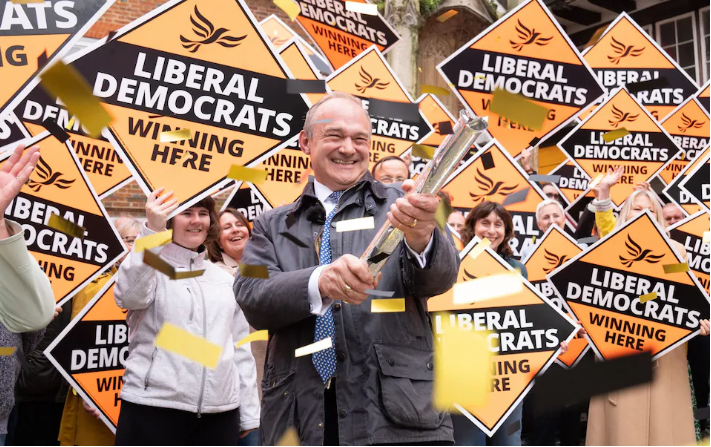Legal papers filed in discrimination case defend barring would-be MPs if they voice religious views which ‘conflict with party values’

David Campanale, a former BBC journalist, is suing the Lib Dems over claims he was ousted from standing as a party candidate because of his Christian faith
A person cannot be a Liberal Democrat if they are against abortion, the party has suggested in leaked documents.
In legal papers filed by the party as part of a discrimination case, the Lib Dems have defended barring prospective MPs if they voice certain religious views.
The remarks have emerged amid a row involving David Campanale, a former BBC journalist, who is suing the party over claims he was ousted from standing as a would-be MP because of his Christian faith.
It threatens to stoke tensions at the Lib Dems’ annual conference in Brighton this weekend, amid accusations that officials are attempting to secularise the party.
Mr Campanale alleges that he faced religious discrimination after he was deselected as the Lib Dems’ candidate for Sutton and Cheam earlier this year.
He is accused of having been involved with the Christian People’s Alliance (CPA), a political party that has campaigned against abortion and gay marriage, and of failing to sufficiently disclose his faith during the selection process – a claim Mr Campanale denies.
The party’s official defence in the legal proceedings, submitted at Liverpool County Court last week and seen by this newspaper, claims the Lib Dems “had a right to deselect” him.
‘Fundamental values’
In the 34-page file, the Lib Dems defended their decision to sack Mr Campanale by claiming his “expressed religious beliefs against abortion, gay marriage and legal sex change conflicted with the fundamental values set out” in the party’s governing document.
The Lib Dems also claimed that they had a right to deselect Mr Campanale because holding “such beliefs could, through their incompatibility with the Liberal Democrats’ policy positions on those matters, undermine the party’s ability to gain the confidence of the electorate in the constituency of Sutton and Cheam”.
Rowan Williams, the former Archbishop of Canterbury has intervened in the row, suggesting it could set a dangerous precedent and make it “impossible” for some religious people to join political parties.

Rowan Williams, the former Archbishop of Canterbury, has suggested the Lib Dems’ stance could make it ‘impossible’ for some religious people to join political parties
“The Liberal Democrat Party’s response to Campanale’s legal challenge has been to say that reservations about – for example – abortion or same-sex marriage are in conflict with ‘fundamental values’ held by the party,” Mr Williams told The Telegraph.
“If it is indeed impossible even to hold dissenting views, this ought to make it impossible for Orthodox Jews and most Muslims as well as Catholic and other Christians to represent the party. Is this really what the Lib Dems are saying?
“You may or may not agree with the personal beliefs of David Campanale – I share some but by no means all of them – but the precedent is a worrying one.”
‘Issues of conscience’
Mr Williams added: “It is not enough to preserve one’s private conscientious judgement, it seems; total agreement in private and in public is demanded.”
The former Archbishop of Canterbury also noted that it comes despite assurances from Sir Ed Davey, the Lib Dem leader, that some topics, such as abortion and euthanasia, must remain “issues of conscience”.
Sir Ed responded to an open letter in 2020 raising concerns about conscience voting in the Lib Dems. He warned of a “growing intolerance within progressive, liberal parties the world over”, and insisted the right of MPs to vote freely according to their religious or ethical concerns “must be defended”.

Sir Ed Davey, the Lib Dem leader, insisted the right of MPs to vote freely according to their religious or ethical concerns ‘must be defended’
The Lib Dems have been reported to the equalities watchdog amid claims the party has tolerated a “hostile environment” for people of faith.
The Equality and Human Rights Commission (EHRC) is now consulting on whether to launch an investigation into the claims, The Telegraph understands.
An email sent by the EHRC last week said that requests for investigations “require thorough consideration and consultation and therefore take longer for us to respond to than standard queries”.
Protected under equality laws
Mr Campanale’s legal claim alleges that the deselection process did not follow party rules and that the “true motivation” was his religious beliefs, which are protected under equality laws.
It also claims that he did not openly express anti-abortion or anti-gay marriage views in the selection process to become a Lib Dem candidate, and that his previous ties with the CPA were instead used against him.
The Lib Dems’ legal defence admitted that Luke Taylor, Mr Campanale’s replacement, told the former journalist that “the party of past prominent Liberal Democrats with Christian beliefs, such as Shirley Williams and Charles Kennedy, was ‘over’”.
“That was a statement of fact reflecting the current policy platforms and public political stance of the Liberal Democrats, as shaped democratically by the decisions of its membership,” the legal document said.

Luke Taylor, who replaced Mr Campanale as candidate for Sutton and Cheam, said the previous Lib Dem party of prominent Christians was ‘over’
It also claimed Mr Campanale was kicked out of the party for his “negative behaviours”, including “a failure to listen” and “an expectation that others should do his work for him”, alongside accusations that he “took criticism personally” and was “inflexible, selective and dogmatic”.
The document claimed the decision to oust the former journalist was “quintessentially an exercise of political judgment about what was best for the local party”.
‘We will not be gaslighted by him’
A Liberal Democrat source said: “This is a case about a candidate who was dishonest and behaved badly towards local volunteers and we will not be gaslighted by him.
“The Liberal Democrat leader and a large number of our MPs are practising Christians, including many who were elected for the first time in July, and we refute this cherry picking from a 60-page legal document.”
A spokesperson for the EHRC said it “receives complaints each week about allegations of unlawful activity contrary to the Equality Act 2010. We consider each complaint carefully and take action where appropriate”.


